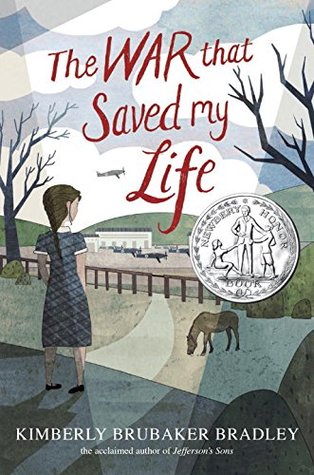I have found 2016 somewhat dispiriting. Not that good things haven’t happened in 2016. My first-ever nephew is presently incubating, for instance. I got to go see Hamilton. I discovered this conceptual framework called mattering maps that blew my brains out through the back of my head.1 But also, like, it’s been a rough year. July has been a particularly rough month to be a liberal girl in Louisiana.2
THEREFORE. Believe me when I say that The War That Saved My Life is the balm for my soul that I needed. I saw it on the counter at my mum’s place and inquired about it, and she said, “Oh, it’s very sweet. It’s about a little girl with an abusive mother who gets evacuated with her little brother. It’s like Good Night Mr. Tom, sort of!” and I said “GIVE ME IT TO BORROW PLEASE” and then I became suspicious because 2016 has been that sort of year so I said “Does the little girl die?” and Mumsy said no and I said “Does the brother die?” and she said no and I said “Is there any sort of animal or senile but beloved granny that I didn’t think to ask about who dies?” and she said no so I borrowed it.
(I know. You’re thinking “You are very demanding for somebody asking a favor.” This is what 2016 has done to me, friends. All my manners are gone. Only angry demands remain.)

Ada has never been allowed outside of her London flat — not for school, not to run errands, not for anything — lest someone see her clubfoot and think worse of her mother. But when her little brother Jamie, the only person in the world she cares about, is ordered to be evacuated from London in advance of the coming war with Germany, she sneaks out with him. Soon they are living with Susan Smith, a reluctant caregiver in the countryside. Does Susan eventually come to love the children and do they love her back? YES ABSOLUTELY.
(I was going to be coy but 2016 has just been a really rough time, and I honestly couldn’t bear to leave y’all in suspense.)
Though Ada and Jamie’s mother is a little cartoonish in her nastiness (Willy’s mum in Good Night Mr. Tom seems far better sketched out), the excellence of this book was in Ada’s emotional life. Jamie, who is younger, adapts quickly to the idea of having a stable home where he is loved, but Ada is a tangle of fear and fury and sadness, an emotional knot that isn’t easily picked apart. Baker doesn’t elide the difficulty of this, or oversimplify how hard it is for Ada to get past the abuse she’s suffered all her life. Watching Ada and Susan — each of them sad and damaged, each of them trying their best — struggle towards a place of mutual trust and honesty is the loveliest thing.
I shrugged. “I thought maybe that was why Mam hated me.”
Miss Smith’s hand touched my shoulder. When she spoke, her voice was uneven. “She doesn’t — I’m sure it’s not–” She stopped walking and turned to face me. “I don’t know what to say,” she said, after a pause. “I don’t want to tell you a lie, and I don’t know the truth.”
I’d like to say more measured, sensible things about this book but it was so much what I needed this week that I basically just want to howl ADA LEARNS TO RIDE A HORSE SHE RIDES A HORSE AND THE HORSE DOESN’T DIE until someone hands me a handkerchief.